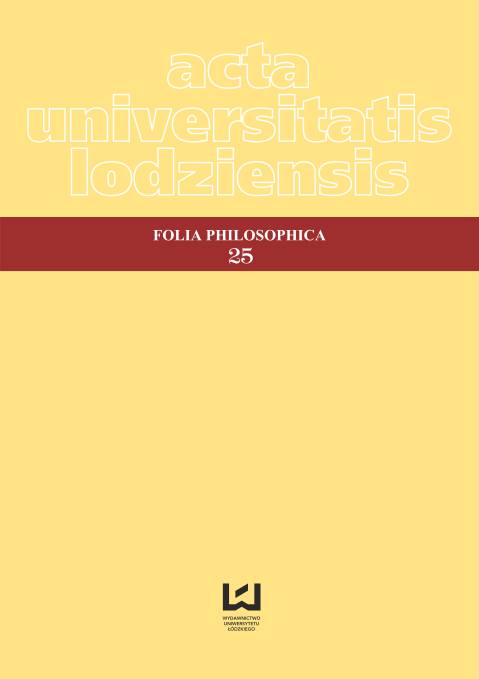Problemy z dyskursem. Czytając Jürgena Habermasa
DOI:
https://doi.org/10.18778/0208-6107.25.05Abstrakt
The author of the paper presents some critical opinions (including her own) on Habermas' conception of language and discourse. At the same time she strives to explain the main controversies which arise from Habermas' key categories. For example Habermas seems to compare the structure of society with the structure of language, underlining the importance of common practice of speech acts. But is there still any room for such communicative activity in the modern postindustrial world? And, first of all, must we really concentrate all our efforts on promoting the communicative rationality? The results of universalization principle, as well as the interrelations between communicative action and discourse (both highlighted in the paper) belong to other problems of Habermas' philosophy. The paper discusses weak points or even inconsistencies which can be noticed in these conceptions. Finally the author reflects on Habermas' ideal speech situation and on "the utopia touch" in Habermas' seemingly practical concepts.Bibliografia
Bolte G. 1989, Einleitung, [w:] tenże (red.), Unkritische Theorie. Gegen Habermas. Lüneburg: Dietrich zu Klampen Verlag.
Google Scholar
Czerniak S. 2002, Lorenz, Plessner, Habermas. Dylematy antropologiczne filozofii współczesnej. Lubicz: Wydawnictwo Rolewski.
Google Scholar
Dux G. 1988, Kommunikative Vernunft und Interesse. Zur Rekonstruktion der normativen Ordnung in egalitär und herrschaftlich organisierten Gesellschaften. W: A. Honneth, H. Joas, Kommunikatives Handeln, Beiträge zu Jürgen Habermas’ „Theorie des kommunikativen Handelns“. Frankfurt/Main: Suhrkamp.
Google Scholar
Gripp H. 1984, Jürgen Habermas, Und es gibt sie doch – Zur kommunikationstheoretischen Begründung der Vernunft bei Jürgen Habermas. Paderborn: Ferdinand Schöningh Verlag.
Google Scholar
Habermas J. 1986, Rekonstrukcyjne ver sus rozumiejące nauki społeczne, przeł. A.M. Kaniowski, „Kultura i społeczeństwo”, 3.
Google Scholar
Habermas J. 1999, Teoria działania komunikacyjnego Tom II, Wydawnictwo Naukowe PWN, Warszawa.
Google Scholar
Habermas J. 1973, Legitimationsprobleme im Spätkapitalismus. Frankfurt/Main: Suhrkamp.
Google Scholar
Habermas J. 1984, Wahrheitstheorien. W: idem, Vorstudien und Ergänzungen zur Theorie des kommunikativen Handelns. Frankfurt/Main: Suhrkamp.
Google Scholar
Habermas J. 1985, Die neue Unübersichtlichkeit. Frankfurt/Main: Suhrkamp.
Google Scholar
Habermas J. 1992, Moralbewußtsein und kommunikatives Handeln. Frankfurt/Main: Suhrkamp.
Google Scholar
Habermas J. 1999, Teoria działania komunikacyjnego. Warszawa: Wydawnictwo Naukowe PWN.
Google Scholar
Habermas J. 1992, Faktizität und Geltung, Suhrkamp, Frankfurt/Main, s. 90.
Google Scholar
Honneth A. i H. Joas 1988, Kommunikatives Handeln, Beiträge zu Jürgen Habermas’ „Theorie des kommunikativen Handelns“. Frankfurt/Main: Suhrkamp.
Google Scholar
Horster D. 2000, Habermas zur Einführung. Hamburg: Junius Verlag.
Google Scholar
Kaniowski A. M. 1987, Jürgen Habermas – metamorfozy teorii krytycznej. W: A.M. Kaniowski, A. Szahaj (red.), Wokół teorii krytycznej Jurgena Habermasa. Warszawa: Kolegium Otryckie.
Google Scholar
Kaniowski A. M. 2003, Charles Taylor i Jürgen Habermas a sposób widzenia języka przez Wilehlma von Humboldta. W: B. Sierocka (red.), Via communicandi. Przełom komunikacyjny a filozoficzna idea konsnesu. Wrocław: Oficyna Wydawnicza ATUT – Wrocławskie Wydawnictwo Oświatowe.
Google Scholar
Kohlberg L. 1981, Essays on Moral Development Vol 1. The Philosophy of Moral Development: Moral Stages and the Idea of Justice. New York: Harper and Row.
Google Scholar
Krasnodębski Z. 1990, Problem postępu etycznego we wczesnych pismach Jürgena Habermasa.
Google Scholar
W: L. Witkowski (red.), Dyskursy rozumu: między przemocą a emancypacją. Z recepcji Jürgena Habermasa w Polsce. Toruń: Wydawnictwo Adam Marszałek.
Google Scholar
Łoziński J. 1990, Apologia myśli Jürgena Habermasa uzupełniona o jej refutację. W: L. Witkowski (red.), Dyskursy rozumu: między przemocą a emancypacją. Z recepcji Jürgena Habermasa w Polsce. Toruń: Wydawnictwo Adam Marszałek.
Google Scholar
Melchior J. 1982, Postmoderne Konflikte um den Konsensus-Begriff. Zum Wiederstreit zwischen Lyotard und Habermas. Wien: Institut für Höhere Studien.
Google Scholar
Schiller H.-E. 1989, Habermas und die kritische Theorie. W: G. Bolte, Unkritische Theorie. Gegen Habermas. Lüneburg: Dietrich zu Klampen Verlag.
Google Scholar
Scruton R. 1988, Habermas. W: tamże, Intelektualiści nowej lewicy. Warszawa-Wrocław: Zysk i S-ka.
Google Scholar
Smrokowska-Reichmann A. 2006, Między kierunkowaniem a sterowaniem. Społeczeństwo Habermasa jako świat życia i system, „Przegląd Filozoficzno-Literacki”, nr 1 (13), s. 241-259.
Google Scholar
Smrokowska-Reichmann A. 2008, Ekwiwalentne wartości, totalna komunikacja. Między Baudrillardem a Habermasem, „Principia”, tom L, s. 267-282, Kraków 2008.
Google Scholar
Szahaj A. 2003, Czy potrzebujemy konsensu? W: B. Sierocka (red.), Via communicandi. Przełom komunikacyjny a filozoficzna idea konsnesu. Wrocław: Oficyna Wydawnicza ATUT – Wrocławskie Wydawnictwo Oświatowe.
Google Scholar
Taylor Ch. 1988, Sprache und Gesellschaft. W: A. Honneth, H. Joas, Kommunikatives Handeln, Beiträge zu Jürgen Habermas’ „Theorie des kommunikativen Handelns“. Frankfurt/Main: Suhrkamp.
Google Scholar
Taylor Ch. 1996, Etyka autentyczności. Kraków: Znak.
Google Scholar
Taylor Ch. 2001, Źródła podmiotowości: narodziny tożsamości nowoczesnej. Warszawa: Wydawnictwo Naukowe PWN.
Google Scholar
Thomas L. 1998, Moralność i rozwój psychologiczny. W: P. Singer (red.), Przewodnik po etyce. Redakcja naukowa wydania polskiego J. Górnicka. Warszawa: Książka i Wiedza.
Google Scholar
Türcke Ch. 1984, Befreiung der Philosophie von der Gesellschaft. W: M. Löbig, G. Schweppenhauser (red.), Hamburger Adorno Symposion. Lüneburg: Dietrich zu Klampen Verlag.
Google Scholar
Türcke Ch. 1987, Habermas oder Wie kritische Theorie gesselschaftsfähig wurde. W: G. Bolte (red.), Unkritische Theorie. Gegen Habermas. Lüneburg: Dietrich zu Klampen Verlag.
Google Scholar
van Reijen W. 2000, Die Aushöhlung der abendländischen Kultur. W: D. Horster, Habermas zur Einführung. Hamburg: Junius Verlag.
Google Scholar
White S. K. 1988, The recent work of Jürgen Habermas: reason, justice and solidarity. New York: Cambridge University Press.
Google Scholar
DOI: https://doi.org/10.1017/CBO9780511598265
Zimmermann A. 1985, Utopie-Rationalität-Kritik. Zu Kritik, Rekonstruktion und Systematik einer emanzipatorischen Gesellschaftstheorie bei Marx und Habermas, Alber, Freiburg im Breisgau.
Google Scholar
Pobrania
Opublikowane
Jak cytować
Numer
Dział
Licencja

Praca jest udostępniana na licencji Creative Commons Attribution-NonCommercial-NoDerivatives 3.0 Unported License.












